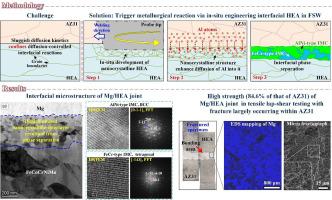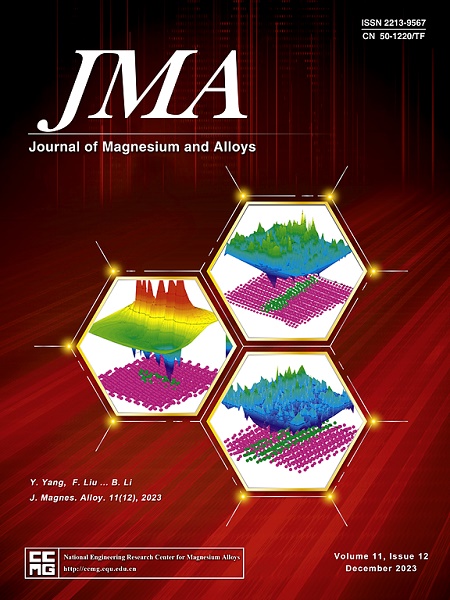Robust interfacial bonding achieved via phase separation induced by enhanced Al diffusion during AZ31/high-entropy alloy friction stir welding
IF 15.8
1区 材料科学
Q1 METALLURGY & METALLURGICAL ENGINEERING
引用次数: 0
Abstract
Welding high-entropy alloy (HEA) to Mg alloy has gained increasing attention for multi-metal structure design, while intrinsic sluggish diffusion kinetics of HEA confines diffusion-controlled interfacial reactions and makes it challenging to establish robust metallurgical bonding. This study investigated welding of FeCoCrNiMn HEA to commercial AZ31 as a model combination to pioneer this field. Interfacial phase separation phenomenon was observed, with the diffusion accelerated by in-situ engineering a submicron-scale thick (∼400–500 nm) HEA nearby the interface into nanocrystalline-structure during friction stir welding. Abundant grain boundaries generated in this nanocrystalline-interlayer serve as diffusion short-circuits and energetically preferred nucleation-sites, which promoted Al in AZ31 to diffuse into HEA and triggered quick separation into body-centered cubic AlNi-type and tetragonal FeCr-type intermetallics. HEA and AZ31 were thus metallurgically bonded by these interfacial intermetallics. The joint shows exceptional strength in tensile lap-shear testing with fracture largely occurred within AZ31 rather than right along interface as commonly reported previously for dissimilar joints.


在 AZ31/高熵合金搅拌摩擦焊接过程中,通过增强铝扩散引起的相分离实现牢固的界面结合
在多金属结构设计中,高熵合金(HEA)与镁合金的焊接越来越受到关注,而 HEA 固有的缓慢扩散动力学限制了扩散控制的界面反应,使其难以建立稳固的冶金结合。本研究调查了铁钴铬镍锰 HEA 与商用 AZ31 的焊接情况,作为这一领域的先驱。在搅拌摩擦焊接过程中,通过在界面附近将亚微米级厚度(400-500 nm)的 HEA 原位加工成纳米晶结构,加速了扩散,从而观察到了界面相分离现象。在这种纳米晶-夹层中产生的大量晶界可作为扩散短路和能量优先成核点,从而促进 AZ31 中的铝扩散到 HEA 中,并引发快速分离为体心立方 AlNi- 型和四方 FeCr 型金属间化合物。因此,HEA 和 AZ31 通过这些界面金属间化合物实现了冶金结合。该接头在拉伸搭接剪切测试中显示出超强的强度,断裂主要发生在 AZ31 内部,而不是像以前常见的异种接头那样沿着界面断裂。
本文章由计算机程序翻译,如有差异,请以英文原文为准。
求助全文
约1分钟内获得全文
求助全文
来源期刊

Journal of Magnesium and Alloys
Engineering-Mechanics of Materials
CiteScore
20.20
自引率
14.80%
发文量
52
审稿时长
59 days
期刊介绍:
The Journal of Magnesium and Alloys serves as a global platform for both theoretical and experimental studies in magnesium science and engineering. It welcomes submissions investigating various scientific and engineering factors impacting the metallurgy, processing, microstructure, properties, and applications of magnesium and alloys. The journal covers all aspects of magnesium and alloy research, including raw materials, alloy casting, extrusion and deformation, corrosion and surface treatment, joining and machining, simulation and modeling, microstructure evolution and mechanical properties, new alloy development, magnesium-based composites, bio-materials and energy materials, applications, and recycling.
 求助内容:
求助内容: 应助结果提醒方式:
应助结果提醒方式:


